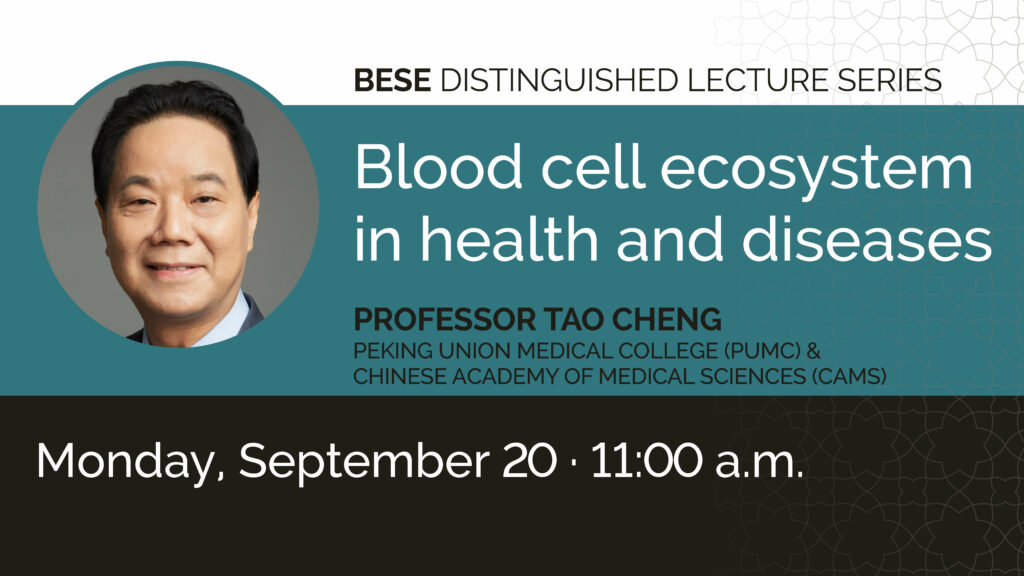
Monday, September 20, 2021
11:00 a.m. (AST)
On Zoom
Blood cell ecosystem in health and diseases
By Professor Tao Cheng, Peking Union Medical College (PUMC) & Chinese Academy of Medical Sciences (CAMS)
Abstract
Residing at the apex of hematopoietic hierarchy, hematopoietic stem and progenitor cells (HSPCs) give rise to all mature blood cells. In the last decade, single-cell RNA sequencing as well as multi-omics technologies have made significant progress, uncovering the heterogeneity of previously defined human HSPCs. From the embryonic stage through adult stage to aging, single-cell studies enabled us to trace the origins of hematopoietic stem cells (HSCs), demonstrating different hematopoietic differentiation routes during development, as well as identifying novel cell populations.
For both hematological benign and malignant diseases, single-cell omics technologies have begun to reveal cellular complexity, map clonal evolution and dissect micro environmental ecosystem, thereby greatly broadening our understanding on disease development. Moreover, by single cell technologies, there have been also advances in the molecular mechanisms for relapse and therapeutic targets of hematological disorders and other non-hematological diseases. Further extensive exploration on hematopoiesis at single-cell levels should facilitate broader clinical applications of HSPCs, as well as disease prognosis.
About the speaker
Tao Cheng is currently a professor of medicine at Peking Union Medical College (PUMC) and Chinese Academy of Medical Sciences (CAMS), president of Institute of Hematology & Blood Diseases Hospital at CAMS, director of State Key Laboratory of Experimental Hematology, also the founding chairman of Department of Stem Cell and Regenerative Medicine at PUMC, the founding director of Center for Stem Cell Medicine at CAMS and the founding president of Chinese Association for Blood Sciences (CABS).
Cheng received his medical degrees from Second Military Medical University in Shanghai, China (1981-1989). He did his residency in internal Medicine and clinical fellowship in Hematology at Changhai Hospital, Shanghai, China (1989-1993). He received his postgraduate research training at Hipple Cancer Research Center, Dayton, Ohio and Massachusetts General Hospital, Boston, Massachusetts (1993-1997). He became an instructor in Medicine in 1998, then an assistant professor in 2001 at Harvard University, an associate professor with tenure (2006-2010) and later a full professor at University of Pittsburgh School of Medicine (2010-2013).
Cheng‘s laboratory primarily focuses on both genetic and epigenetic mechanisms in hematopoietic stem and progenitor cells, with each project guided by approaches intended to elucidate basic principles and develop practical strategies. Leukemia and bone marrow failure are the main diseases against which research advances in the laboratory are achieved. Through broadly collaborative approaches, Cheng is also committed to training hematologists and stem cell biologists, and to building strong hematology and stem cell research programs that will ultimately benefit the patients.
Cheng is the founding editor-in chief of Blood Science, the first English fundamental hematology journal in China. He has been in the editorial board of several leading journals in hematology and stem cell research including Blood, Leukemia, Experimental Hematology (associate editor) and International Journal of Hematology (associate editor).

